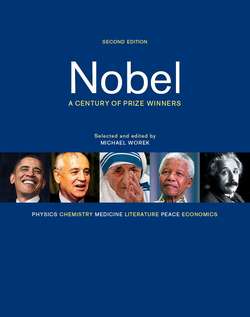Читать книгу Nobel - Michael Worek - Страница 46
На сайте Литреса книга снята с продажи.
ОглавлениеMax Planck (1858–1947)
1918 Physics
In recognition of the services he rendered to the advancement of physics by his discovery of energy quanta.
Max Karl Ernst Ludwig Planck was one of the most important physicists of the 20th century, and his work in quantum and atomic physics made him one of the founding fathers of these fields. Born in Kiel, Germany, the son of Julius Wilhelm, a professor of constitutional law, Planck studied at the University of Munich and completed his doctorate there in 1879. In 1880 he began the first of five years of teaching at the University of Munich, after which he returned to the University of Kiel and taught theoretical physics until 1889. In that same year he was made associate professor at the University of Berlin, where he remained until his retirement in 1926.
Planck’s first investigative work focused on questions of thermodynamics. But, on arriving in Berlin, he decided to study the distribution of energy in the spectrum of radiation of a black body, a phenomenon not explained by classical statistical mechanics. In 1900 Planck revealed that radiated energy was emitted or absorbed in a discontinuous manner and only in certain well-defined quantities, equal to a minimum value or a multiple of that value. Planck called this minimum quantity of energy, proportional to the frequency of the radiation emitted or absorbed, a “quantum” of energy or photon.
Although revolutionary, other physicists initially received these discoveries poorly. Nevertheless, soon the scientific community came to appreciate Planck’s achievements, and he was awarded the 1918 Nobel Prize in Physics. In 1926 he was elected as a foreign member to the Royal Society, he received the Copley Society medal in 1928 and was president of the Kaiser Wilhelm Society (later renamed the Max Planck Institute) between 1930 and 1937.
Planck, unfortunately, had a private life marked by numerous tragedies. In 1909 his first wife Marie Merck, whom he had married in 1885, died, and he later lost two daughters. He remarried in 1911, to Marga von Hosslin. During World War II his eldest son was sent to the frontline, while the other was shot by the Gestapo for being involved in the attempt on Adolf Hitler’s life on July 20, 1944. Vehemently opposed to the Nazi party, Planck was forced to leave Berlin in 1944, when the house he lived in was ruined. He escaped to Göttingen but never fully recovered from the accumulated sufferings he experienced during the war. He died in 1947.
